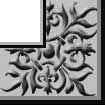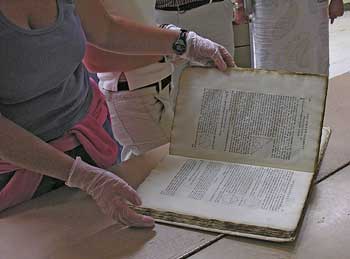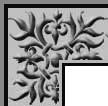
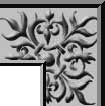
Euclid's Elements and the Declaration of Independence
Mike Molinsky
Following is a summary of Dr. Molinsky's talk with copies of his slides.
The earliest documents we have in mathematics are 3 to 4,000 years old. The Babylonians and Egyptians as well as other cultures used mathematics in astronomy, building, and calculation. In this example from an Egyptian papyrus from 1700 BC the problem illustrates a simple linear equation.

The Egyptians did not try to provide an abstraction or create a theoretical model. They dealt with the specific problems. All that changed with the Greeks. They began to ask why things happened in astronomy, medicine, mathematics, and the world around them. By the time of Euclid (325 - 265 BC) mathematics had changed drastically as compared to early Egyptian attempts.

Euclid's Elements comprises thirteen volumes. It revolutionized mathematics by establishing definitions and postulates and based on these going on to offer proofs of propositions.


Examples of definitions and postulates:
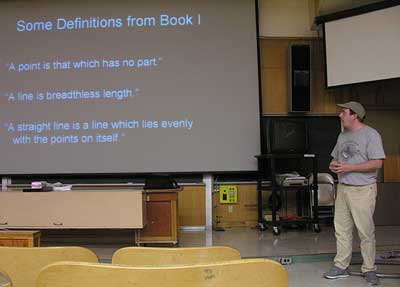




The first proposition proves that the three sides of an equilateral triangle are actually equal. Start by drawing a straight line.

Using the definition of a circle, draw a circle around point A, then around point B:


Draw two more lines:

By definition, a straight line from the center of the circle to the edge is equal to any other straight line drawn from the center of the circle to the edge.



Finally, it is shown that the three sides of the triangle are equal and therefore the triangle is equilateral.


Thomas Jefferson lived 2000 years later. By then, Euclid's Elements had not only influenced mathematics but all other branches of knowledge. The idea of proof, evidence and the use of reason and logic to approach the world underlay science and medicine as well as philosophy.

The first lines of the Declaration of Independence propose that before taking an action one has to show that it has cause and that it needs to be explained.

The first step in the argument is to declare the postulates: 1) All men are created equal and have unalienable Rights, 2) Governments are to secure those Rights, 3) Governments get their powers from the consent of the governed, 4) It is the right of the governed to change Government if it is destructive.

Proof of destructiveness must be submitted. Since the Government has failed to secure the Rights of the governed it is neglecting its duty.

By submitting proofs of the violation of Rights, Thomas Jefferson completed the logic of the Declaration of Independence, making it a document based on law -- universal law.
The form of logic used parallels Euclidian logic and the system of proof. Euclid not only established modern mathematics but gave us a new way to think about our social affairs. It is not sufficient to assert a position, one must prove it based on fundamental principles.
At the end of his talk, Dr. Molinsky invited the audience to examine the edition of the Elements on loan to Mantor library. It is the first English translation made from a Greek manuscript. Previous translations had been based on Arabic documents.

Click on the images below for enlarged views of the manuscript.
|

